Basic Research

ASADA LEELAHAVANICHKUL
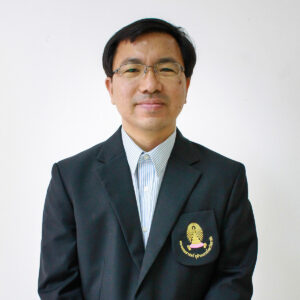
Associate Professor
Immunology Unit, Department of Microbiology, Faculty of Medicine
Research interest :
- Sepsis, probiotics
- macrophages
- neutrophils and animal models
Post doctoral fellowship at NIH, USA for 5 years with 15 publication, including “Nature medicine”. Currently, 10 years in Chulalongkorn with 127 publications on “pubmed” and 20 publications per year for 3 years in a row. Our teams consist of nearly 15 persons with several laboratory techniques (Flow cytometry, Con focal microscopy, Seahorse cell energy analysis, microbiome analysis, etc.). Our ultimate goal is to translate the knowledge from basic science to the bedside clinical practice.

CHAIYABOOT ARIYACHET
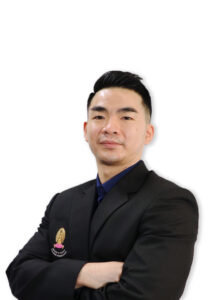
Associate Professor
Department of Biochemistry
Research interest :
- Diabetes
- Liver Fibrosis
- Stem Cell
- Hepatic Stellate Cell
- Reprogramming
I’m interested in cell replacement and gene therapy for diseases related to the gastrointestinal system (gut, liver and pancreas). My previous work has engineered the gastric tissue as a renewable source for insulin production. My current work includes culture of adult stem cells from human gastrointestinal tract as a resource for production of new insulin-producing cells. In addition, I’m working on identifying therapeutic targets for treatment of liver fibrosis.

DAVID MICHAEL PAYNE
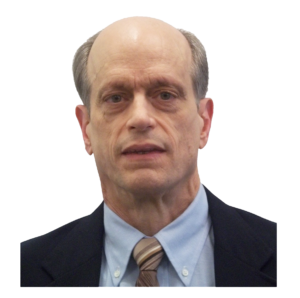
Associate Professor
Division of Research Affairs, Faculty of Medicine, Chulalongkorn University
Research interest :
- Translational Research — Novel ‘Next-Gen’ Antivenoms using Human Monoclonal Antibodies
- Antibody Technology and Immunotherapy
- Systems Biology and Proteomics
- Mechanisms Regulating Cellular Physiology and Signal Transduction
- Cancer Molecular Biology and Biochemistry
David Michael Payne received his undergraduate and doctoral degrees from the University of North Texas (B.S., Biology & Biochemistry; Ph.D., Molecular Biology & Biochemistry). He then completed five years of postdoctoral training at the Cancer Center, University of Virginia (UVA) School of Medicine. As a senior postdoc/assistant professor at UVA, Michael led the research team that discovered the identity of pp42 as MAP kinase and the mechanism for its regulated activation in mammalian signal transduction. He also led another research team that discovered a mechanism for malignant transformation of cells by the src-oncogene tyrosine kinase, involving novel “unscheduled” phosphorylation and activation of growth factor receptors (i.e., activation of receptor signaling in the absence of growth factor binding to receptors). During his career in the USA, Michael was a faculty member at four major universities plus the National Institutes of Health. He established a record of excellence in teaching and mentoring students, competed successfully at the national level for grant funding (National Science Foundation, National Institutes of Health and American Cancer Society), and published consistently in the top 10% of peer-reviewed journals in molecular/cell biology and biochemistry. He has been an international faculty member here at MDCU since 2015 (Feb), originally helping the director (Dr. Trairak Pisitkun) of the new CU Center of Excellence in Systems Biology to develop and lead that state-of-the-art biotechnology research facility (2015–2018). Since then, Michael has been leading an international collaboration in a translational research project to develop a ‘Next-Gen’ immunotherapy for treatment of snakebite envenoming (which creates more than 2 million victims annually, resulting in more than 400,000 disabilities and 100,000 deaths every year).

CHANCHAI BOONLA
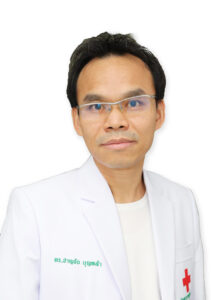
Assistant Professor
Department of Biochemistry
Research interest :
- Oxidative stress
- Epigenetics
- Urolithiasis
- Cancer
- Innovation
CB’s LAB is focusing on oxidative stress and epigenetic alteration in urolithiasis and cancer development. Cancers of our interest are bladder cancer and hepatocellular carcinoma. We have a strong intention to build innovative diagnostic and therapeutic products from our research findings. We seek people who think innovatively and have entrepreneurial mindset to join our journey.

POKRATH HANSASUTA
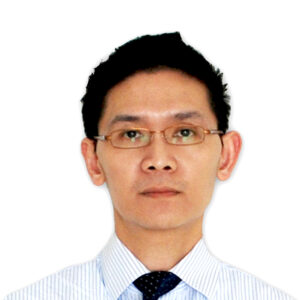
Assistant Professor
Faculty of Medicine , Chulalongkorn University and King Chulalongkorn Memorial Hospital
Research interest :
- Viral Immunology
- Tumour Immunology
- Cellular
- Immunotherapy
- COVID-19, HIV, EBV
My group and I has a focus on Immunology of HIV, Epstein-Barr virus (EBV). Cytomegalovirus (CMV) infections, and more recently SARS-CoV-2. In basic science aspects, we aim to identify mechanisms which people living with these viruses may use to protect or control the infections. Information acquired from our studies can be translated into (prophylactic and therapeutic) vaccine development. We also work on “translational” research area where we develop suitable T cells for treating patients with cancers. These malignancies include nasopharryngeal carcinoma ( cancer of the nasopharynx), T/NK cell lymphoma (a kind of white blood cell cancer), and breast cancer. At the time-being we are running proof-of-concept EBV-specific T cell therapy in Thai patients with advanced nasopharyngeal carcinoma. We have also been successful for development of CD19+ CAR-T cells the cells of which was approved by US FDA in 2017 to treat acute lymphoblastic leukemia (ALL). The treatment, though very effective, is not affordable ($475,000) by almost all of Thai patients and others from poor countries. The CAR-T-cell treatment established in our laboratory would provide otherwise unaffordable therapy for Thai leukemic patients and those from neighboring countries. This state-of-the-art platform help us to develop other CAR-T cells targeting at HIV/AIDS aiming for cure and EBV-associated malignancies. We currently put our effort into COVID-19 research in order to answer two important questions: 1) what is the immune correlate to COVID-19? And 2) Whether people previously vaccinated with inactivated COVID-19 vaccine are boosted with more “potent”vaccine and what are the safety and immunogenicity profiles?

SARAN THANTAVISUT
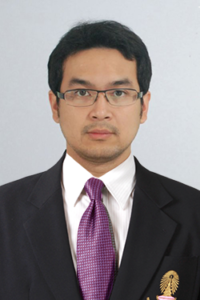
Assistant Professor
Department of Orthopaedic, Chulalongkorn University
Research interest :
- Orthopaedic Trauma
- Geriatric Hip fracture
- Adult reconstruction
- Medical invention
- Infection control
Asst. Prof Saran is an orthopaedic surgeon specialized in orthopaedic trauma and adult reconstruction. He is the pioneer and director of the “Hip Fracture Fast Track” program in King Chulalongkorn Memorial Hospital. His clinical research focused on surgical anatomy, novel surgical techniques, biomechanics study and geriatric trauma. He also achieved Ph.D. in biomedical engineering and currently performing various researches in collaboration with faculty of engineer, Faculty of pharmacy and Biochemistry departments. His non-clinical research focused on medical instrument invention, biomaterials, infection control modalities, 3D printing in medicine and controlled release medication.

SUWATCHAREEPORN ROTCHEEWAPHAN
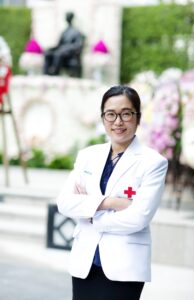
Lecturer
Department of Microbiology, Faculty of Medicine, Chulalongkorn University
Research interest :
- Clinical bacteriology
- Mycobacteriology
- Drug susceptibility testing
- Diagnostic microbiology
Dr. Suwatchareeporn Rotcheewaphan is a lecturer of Department of Microbiology, Faculty of Medicine, Chulalongkorn University. She is providing teaching at Faculty of Medicine, Chulalongkorn University and King Chulalongkorn Memorial Hospital. Currently, she is a director of Microbiology laboratory at Bhumisiri Mangkhalanusorn Building and Mycobacteriology laboratory, King Chulalongkorn Memorial Hospital. Her research focuses on the development of diagnostic methods for bacterial and mycobacterial infections, drug susceptibility testing, and the study of circulating mycobacterial strains in Thailand by using new and high throughput molecular techniques.

SIPAT TRIUKOSE
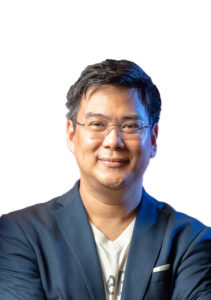
Lecturer
Chulalongkorn University Big Data Analytics and IoT Center (CUBIC)
Research interest :
- Application of Data Science and Digital Technology in Healthcare (e.g. CVD, DM, CKD, Retina, Skin, Lung, COVID-19)
- Large-Scale Performance Evaluation
- Telemedicine
Dr. Sipat Triukose is a member of Chulalongkorn University Big Data Analytics and IoT Center (CUBIC) and a research group on Applied Digital Technology for Medicine (ATM). He is also a member of the Thai Red Cross education and research committee. Early in the career, his areas of interest revolve around performance measurement and evaluation of a large-scale system, such as the Internet and web, content distribution network, computer network, and social network. He later expanded his interest toward big data analytics, digital transformation, and artificial intelligence applications in several fields of study, especially in medical research and the healthcare system. In 2018, he co-founded TrueEye.AI, a medical technology startup focusing on utilizing medical research and deep technology to create a preventive and non-invasive medical solution. Dr. Sipat Triukose received a Ph.D. in Computer Science from Case Western Reserve University (USA). Before joining Chulalongkorn University, he worked for National ICT Australia or NICTA (transformed to Data61 in 2016) in Sydney, Australia.

POOSANU THANAPORNSANGSUTH
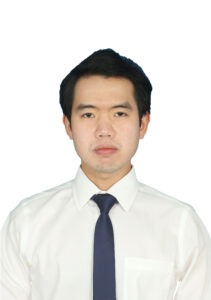
Lecturer
Thai Red Cross Emerging Infectious Disease Health Science Centre/ Division of Neurology, Department of Medicine, King Chulalongkorn Memorial Hospital
Research interest :
- Molecular neurodegeneration
- Prion diseases
- Biomarkers
- Neuroinflammation
- Clinical neurology
Much of Dr. Thanapornsangsuth’s work is translational and focuses on neurodegenerative diseases embracing the core concepts of protein misfolding, propagation and downstream neuroinflammation. Being a clinical neurologist by training, he aspires to developing biomarkers that not only truly reflect the essential defining aspects of these diseases but also are clinically meaningful, easily applicable and require minimal resources. His current projects use seeding assays and mass spectrometry.

CHATCHAI NOPVICHAI
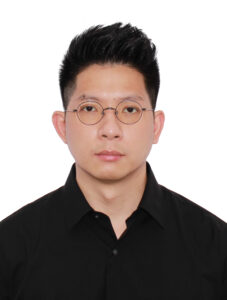
Lecturer
Advanced Laboratory for Neurology and Infectious Diseases, Thai Red Cross Emerging Infectious Diseases Health Science Centre.
Research interest :
- Advanced Diagnosis Techniques
- Multi-Omics
- Emerging Infectious Diseases
- Neurodegenerative Diseases
- Advanced Biochem Med
Dr. Chatchai Nopvichai pioneered the novel uses of Multi-Omics techniques, especially Mass Spectrometry System for medical purpose. His team, “ARDNI” at Thai Red Cross Emerging Infectious Diseases Health Science Centre is a consortium of multi-disciplinary teamwork including physicians, medical technologists, scientists, and bioinformaticians to develop the next generation of biomarkers measurement and diagnosis techniques, also the finding of novel bioactive molecules under the conceptual framework “From Bench to Better Life”. Any research proposals/ideas are welcome at his laboratory.

SOMPONG VONGPUNSAWAD
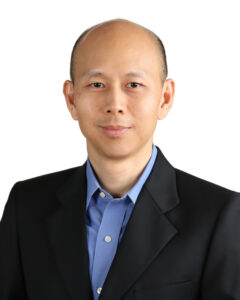
Lecturer
Faculty of Medicine, Chulalongkorn University
Research interest :
- Virology, Molecular Biology
- Microbiology
- Epidemiology
- Medical Genetics
Sompong Vongpunsawad, Ph.D., studies viruses that cause respiratory and enteric diseases in adults and young children. These viruses are often transmitted rapidly and cause wide-ranging symptoms. Vaccination against measles, influenza, and rotavirus have greatly reduced these diseases, but infections by enteroviruses, respiratory syncytial virus, and norovirus remain of concern. The lab’s expertise focuses on the rapid detection of virus infection in patients, surveillance of disease outbreaks in the community, and identification of novel viral variants of clinical importance. Accurate and timely diagnosis of viral infection using molecular/immunological assays will significantly improve patient care and help develop better vaccines and therapies.

SIRA SRISWASDI
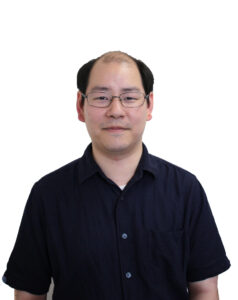
Lecturer
Research Affairs, Head of Computational Molecular Biology Group, Director of Center for Artificial Intelligence in Medicine
Research interest :
- Computational biology,
- Proteomics, Biological networks
- Machine learning
Dr. Sriswasdi studied theoretical mathematics, computer sciences, and computational biology at Massachusetts Institute of Technology and University of Pennsylvania with focuses on mass spectrometry-based proteomics of red blood cells and protein-protein interaction networks in C. elegans. He also did a postdoctoral research on molecular evolution of hybrid fungal genomes at the University of Tokyo. His current research applies bioinformatics and machine learning techniques to answer molecular biology and medical questions – from developing deep learning models for de novo peptide sequencing and diagnosing diseases in chest x-rays to decoding cell developmental pathway from single-cell transcriptomics data.

EINAPAK BOONTAVEEYUWAT
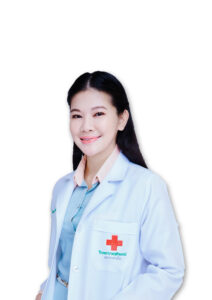
Lecturer
Photodermatology Unit, Division of Dermatology, Department of Medicine, King Chulalongkorn Memorial Hospital and Faculty of Medicine, Chulalongkorn University
Research interest :
- Phototherapy,
- Photodermatoses,
- Photoprotection,
- Sunscreen,
- Photosensitiser development
Dr Einapak Boontaveeyuwat qualified in Medicine at the Chulalongkorn University which was also where she received her M.D. in 2005. After general medical training in Nakhonratchasima (2006-2009) and a period of research in Siriraj Hospital in clinical treatment innovations including radio frequency (2008-2009), she undertook dermatology training in Siriraj Hospital where she developed an interest in photodermatology (2009-2013). She therefore went on to complete a clinical fellowship in Photobiology with Professor Pravit Asawanonda at the Division of Dermatology, King Chulalongkorn Memorial Hospital and Chulalongkorn University, Thailand where she has started an appointment as Consultant Dermatologist and also Clinical Lecturer since November 2015. After another period of clinical research and practice in photodermatoses, photodiagnosis and phototherapy in Photodermatology unit, St John’s Institute of Dermatology, Guy’s Hospital, London, UK (2015-2018), she has resumed her current appointment as Consultant Dermatologist and Clinical Lecturer at King Chulalongkorn Memorial Hospital and Faculty of Medicine, Chulalongkorn University since November 2018. Dr Boontaveeyuwat has clinical and research interests in photosensitivity diseases particularly in xeroderma pigmentosum, porphyrias and actinic prurigo, photodiagnosis, phototherapy including heliotherapy and photodynamic therapy. Dr Boontaveeyuwat has been ambitiously working on Sunrise Phototherapy Network by King Chulalongkorn Memorial Hospital which will offer all the areas in Thailand our exquisite expert services under tele-consultation, RECKON clinic along with safe guided natural sunlight treatments, Self-Heliotherapy in TH (SHOT), Daylight-Photodynamic therapy (Daylight-PDT), and our invented home light based devices (Home PhoD).

CHATCHANAN DOUNGKAMCHAN
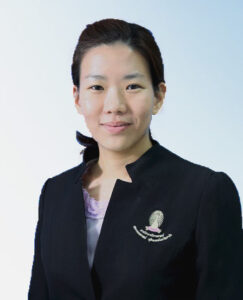
Lecturer
Department of Anatomy, King Chulalongkorn Memorial Hospital and Faculty of Medicine, Chulalongkorn University
Research interest :
- fertility preservation in transgender women
- stem cells
- spermatogenesis
- infertility
Dr. Doungkamchan received her medical degree from Chulalongkorn University in 2012 and was assigned to a lecturer position at the department of Anatomy since 2014. She received PhD in molecular biology and developmental biology from the University of Pittsburgh School of Medicine, USA in 2020. She also continued for a brief postdoctoral training on the same research focus of spermatogonial stem cell and infertility. The ongoing research project includes fertility preservation in transwomen. We will explore the need, expectations and perspectives of transwomen towards fertility preservation procedures. Student will also have a chance to examine mechanisms of infertility to determine appropriate fertility preservation measures for transwomen.

CHAROENCHAI PUTTIPANYALEARS
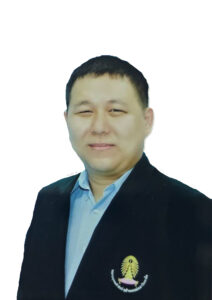
Lecturer
Center of Excellence in Molecular Genetics of Cancer and Human Disease, Department of Anatomy, Faculty of Medicine, Chulalongkorn University
Research interest :
- cancer screening
- cancer genetics
- epigenetics
Dr. Charoenchai Puttipanyalears is affiliated to Medicine, Chulalongkorn University. He has authored and co-authored several national and international publications and also working as a reviewer for reputed professional journals. His research mainly focused on cancer screening marker, cancer genetics and epigenetics especially for WBCs marker. He is having an active association with different societies and academies around the world.

CHINDANAI HONGSAPRABHAS
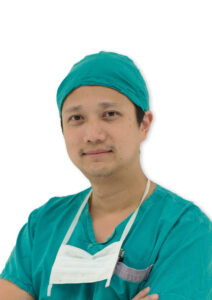
Lecturer
Department of Orthopaedics Faculty of Medicine, Chulalongkorn University
Research interest :
- Orthopaedic surgery
- Musculoskeletal tumor surgery
- Biomedical engineering
Dr. Chindanai Hongsaprabhas is an orthopaedic surgeon specialized in musculoskeletal tumor and general orthopaedic surgery. His research focused on oncological and functional aspects of musculoskeletal tumor surgery, novel surgical techniques, computer assisted surgery, and innovative 3-D orthopaedic implants. He was invited to share experiences and presentations in many international academic meetings in the past 10 years.

THUN ITTHIPANICHPONG

Lecturer
Department of Orthopaedics Faculty of Medicine, Chulalongkorn University
Research interest :
- Arthroscopy
- Sports injury,
- Biomechanics
- Anatomy
Dr. Itthipanichpong received medical degree from the Chulalongkorn University, completed four years of training in orthopaedics and one year in sports medicine fellowship at King Chulalongkorn Memorial Hospital. His clinical interests are hip, knee and shoulder conditions included tendon tear, joint instability, traumatic injury, degenerative change and replacement surgery. Common diseases found in his clinic are rotator cuff tear, ACL injury, meniscus injury, shoulder instability and activity-related musculoskeletal pain. He is now working on many research projects and creates many surgical techniques for arthroscopic surgery. He is also working on a Ph.D project at at the department of biomedical engineering, Chulalongkorn university.

CHAIPAT CHUNHARAS
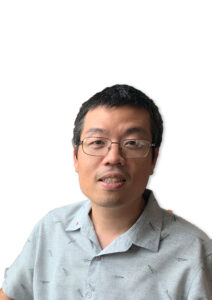
Lecturer
Chulalongkorn Cognitive, Computational & Clinical Neuroscience
Research interest :
- Cognitive Neuroscience
- Experimental Psychology
- AI
- Neurology
CC received his subspecialty trainings in Neurology and Internal Medicine and did his PhD in experimental psychology (Cognitive Behavioral Neuroscience subfield) at UCSD. His current researches focuses on bridging the gap between basic and clinical neuroscience.

NAWASIRI SIRIPRASERT
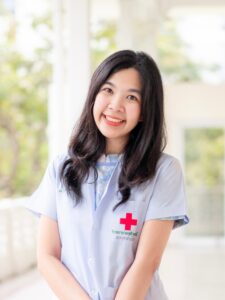
Lecturer
- Department of Academic Affairs (CU-MEDi program)
- Department of Family Medicine, Faculty of Medicine, Chulalongkorn University
Research interest :
- Family Medicine
- Geriatrics and Gerontology
- Primary Care
- Health Promotion and Disease Prevention
Dr. Nawasiri Siriprasert graduated Doctor of Medicine and Board of Family Medicine from Faculty of Medicine, Chulalongkorn University. Her research interests are in Family Medicine, Geriatrics and Gerontology, Primary Care, Health Promotion, and Disease Prevention.

PORNCHAI KAEWSAPSAK
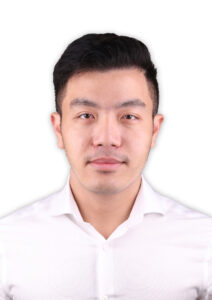
Lecturer
Biochemistry Department, Faculty of Medicine
Research interest :
- Nanopore sequencing
- CRISPR-based detection Molecular biology
Our projects will mainly focus on two areas. We apply new CRISPR-Cas technology to detect nucleic acid for diagnosis or prognosis of different pathogens or disease-related genomic mutation. We are also interested in Nanopore sequencing, which new technology for long read DNA and native RNA sequencing. We are currently applying it to detect RNA modifications and identify genome of various microbes.

PHATCHARAPA OSATEERAKUN
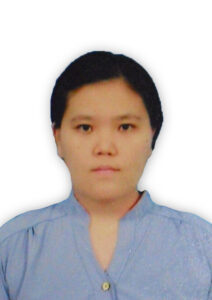
Lecturer
Department of Orthopaedics Faculty of Medicine
Research interest :
- Paediatric Orthopaedics
- Gait analysis
Dr. Osateerakun is a paediatric orthopaedist. The area of interests are deformity corrections especially in Cerebral Palsy patients and the related investigations, especially gait analysis. She has been doing a PhD project towards the feasible of using inertial measurement units for clinical gait analysis at Liverpool John Moores university, United Kingdom and would like to continue conducting the research for the benefit of Thai patients.

WARINYA CHEMNASIRI

Lecturer
Chulalongkorn School of Integrated Innovation
Research interest :
- Smart Material
- Sensors
- New Product Development
- Innovation in healthcare and medical applications
Dr. Warinya Chemnasiri has a professional experience across academia and industry developing new products from design to mass production. Her previous works include design, development, and fabrication of optical sensor prototypes with UI software and new telecommunication product development for autonomous car. With extensive experience in nanomaterial and sensors, her research interest involves smart material and sensors in healthcare and medical applications, and beyond towards innovation projects in this area. She is currently ScII Academic Director and Lecturer at BAScii program, where she is building an innovation ecosystem in line with SDG #9 (Industry, Innovation & Infrastructure), as well as a fellow of the Innovative Teaching Scholar Program (Stanford University).

TALENT THEPAREE
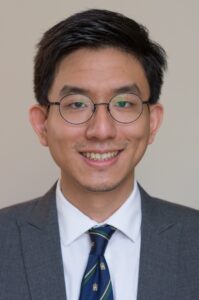
Lecturer
Faculty of Medicine, Chulalongkorn University
Research interest :
- Molecular pathology
- surgical pathology
- quality assurance
I am a board-certified surgical and molecular pathologist with a dream of making genomic testing more widely available in Thailand for diagnostic, prognostic, and therapeutic purposes. I did my training in the US (Chicago and the San Francisco Bay Area) and have previously done both quality improvement projects and new test validation for labs. I believe that creating usable infrastructure and good systems is a foundation of medical care.

